 Petzlover
Petzlover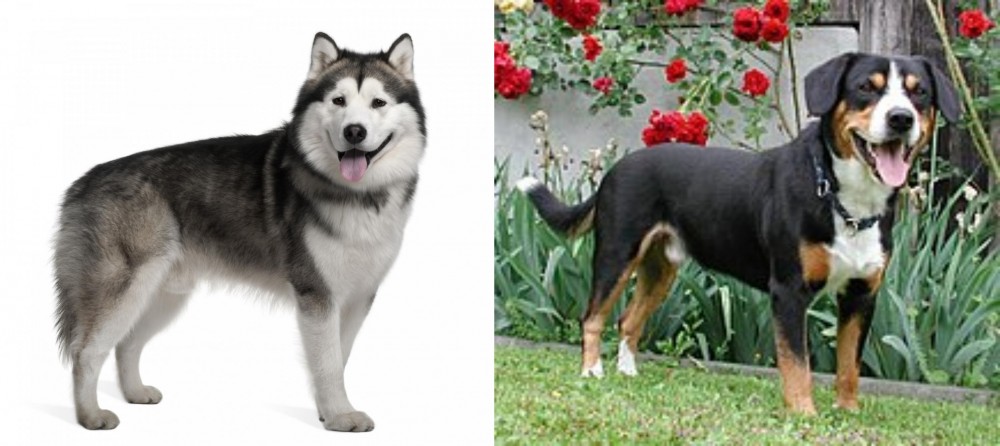 Alaskan Malamute is originated from United States but Entlebucher Mountain Dog is originated from Switzerland. Alaskan Malamute may grow 14 cm / 6 inches higher than Entlebucher Mountain Dog. Alaskan Malamute may weigh 9 kg / 20 pounds more than Entlebucher Mountain Dog. Both Alaskan Malamute and Entlebucher Mountain Dog has almost same life span. Alaskan Malamute may have less litter size than Entlebucher Mountain Dog. Alaskan Malamute requires High Maintenance. But Entlebucher Mountain Dog requires Moderate Maintenance
Alaskan Malamute is originated from United States but Entlebucher Mountain Dog is originated from Switzerland. Alaskan Malamute may grow 14 cm / 6 inches higher than Entlebucher Mountain Dog. Alaskan Malamute may weigh 9 kg / 20 pounds more than Entlebucher Mountain Dog. Both Alaskan Malamute and Entlebucher Mountain Dog has almost same life span. Alaskan Malamute may have less litter size than Entlebucher Mountain Dog. Alaskan Malamute requires High Maintenance. But Entlebucher Mountain Dog requires Moderate Maintenance
 Alaskan Malamute is one of the oldest breeds. Thousands of years ago, native people in the land between Alaska and Siberia. From the beginning, this breed is used as working dogs. Alaskan Malamute was a perfect dog for seal or bear hunting, and sledding supplies back home. During the gold rush, this breed became even more popular, and that popularity only grew over the years. They have been popular even during the war years. Army used them as sled dogs in the war.
Alaskan Malamute is one of the oldest breeds. Thousands of years ago, native people in the land between Alaska and Siberia. From the beginning, this breed is used as working dogs. Alaskan Malamute was a perfect dog for seal or bear hunting, and sledding supplies back home. During the gold rush, this breed became even more popular, and that popularity only grew over the years. They have been popular even during the war years. Army used them as sled dogs in the war.
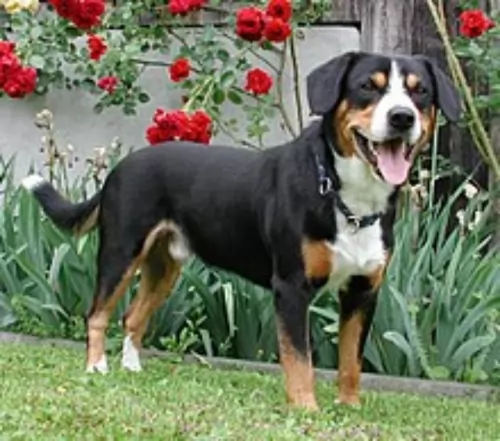 The Entlebucher Mountain Dog is the smallest of the Swiss Mountain Dogs, but he is still a powerful dog used to herd cattle. The four breeds are the Bernese Mountain Dog, the Greater Swiss Mountain Dog, the Appenzeller Mountain Dog and the Entlebucher. It was though that these dogs came to Switzerland with the Romans over 2 centuries ago. The Entlebucher was put to work guarding and herding sheep, pulling carts and flocking cattle. Toward the end of the 19th century the breed was on the edge of extinction because many were breeding them with German Shepherds. So, Franz Schertenleib, in 1889 brought all the existing Entlebuchers together and bred them. He is credited with keeping the breed alive.
The Entlebucher Mountain Dog is the smallest of the Swiss Mountain Dogs, but he is still a powerful dog used to herd cattle. The four breeds are the Bernese Mountain Dog, the Greater Swiss Mountain Dog, the Appenzeller Mountain Dog and the Entlebucher. It was though that these dogs came to Switzerland with the Romans over 2 centuries ago. The Entlebucher was put to work guarding and herding sheep, pulling carts and flocking cattle. Toward the end of the 19th century the breed was on the edge of extinction because many were breeding them with German Shepherds. So, Franz Schertenleib, in 1889 brought all the existing Entlebuchers together and bred them. He is credited with keeping the breed alive.
It is believed that the breed comes originally from a valley in the District of Cantons Lucerne and Berne, called Entlebuch. They were considered the same breed as the Appenzell Cattle Dog until 1913 when they were classified as a Mountain Dog – the fourth breed of Mountain Dog. The AKC did not recognize the breed until 2011.
 Average weight of Alaskan Malamute variates from dog to dog, but male weights 37-39kg, while female weight is 32-34kg. An average height of the male is 62-64cm, while females are slightly smaller with a height of 56-58cm.
Average weight of Alaskan Malamute variates from dog to dog, but male weights 37-39kg, while female weight is 32-34kg. An average height of the male is 62-64cm, while females are slightly smaller with a height of 56-58cm.
A lifespan of this breed is 12-15, but if your dog is healthy with the balanced diet they tend to live much longer.
Litter Size of Alaskan Malamute is 4-8 puppies, but this depends on every dog.
Other Names for Alaskan Malamute are Mal and Mally
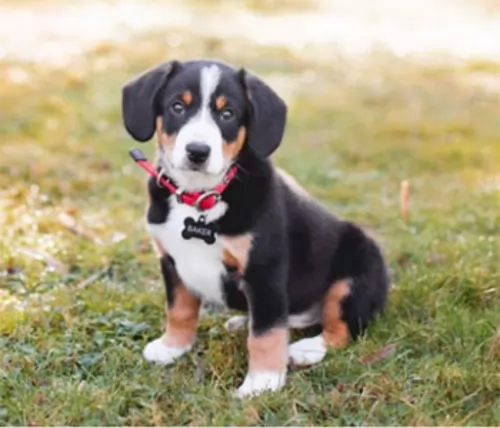 The Entlebucher Mountain Dog is a muscular, compact, and medium sized dog. Their heads are square, and the skull is flat. He has dark eyes that are alert and expressive in a friendly way. Their ears are triangular and hang on the side of his head. With compact feet, a muscular body and well angled hocks, he is a good looking dog and ready for his jobs.
The Entlebucher Mountain Dog is a muscular, compact, and medium sized dog. Their heads are square, and the skull is flat. He has dark eyes that are alert and expressive in a friendly way. Their ears are triangular and hang on the side of his head. With compact feet, a muscular body and well angled hocks, he is a good looking dog and ready for his jobs.
His coat is striking, and it is familiar in its closeness to the other Mountain Dogs coats. Yet he has some distinctive differences that tell you this is not a Bernese or a Swiss, it is an Entlebucher.
 Alaskan Malamutes are playful dogs that love running, playing and spending time outside with their family. They would greet anyone who comes to your house, no matter if they are first-time visitors. That makes them bad watchdogs. Since they are a pack breed, they love spending time with humans and they love being included in activities. Generally speaking, they are great with children. They have a lot of patience for the little ones in your family. If they are socialized properly, you will not have any problems with other animals. They love playing and spending time running around, so you will not have to worry. They might run towards cats, so you have to be careful. Alaskan Malamute is not very easy to train because they are very intelligent and stubborn breed. Not very recommendable for new owners. The best way to train your puppy is with patience, consistency and positive awarding. They do not like the old-fashioned way of punishment with beating included. Instead, rather try being positive and give your dog nice treat when the task is completed.
Alaskan Malamutes are playful dogs that love running, playing and spending time outside with their family. They would greet anyone who comes to your house, no matter if they are first-time visitors. That makes them bad watchdogs. Since they are a pack breed, they love spending time with humans and they love being included in activities. Generally speaking, they are great with children. They have a lot of patience for the little ones in your family. If they are socialized properly, you will not have any problems with other animals. They love playing and spending time running around, so you will not have to worry. They might run towards cats, so you have to be careful. Alaskan Malamute is not very easy to train because they are very intelligent and stubborn breed. Not very recommendable for new owners. The best way to train your puppy is with patience, consistency and positive awarding. They do not like the old-fashioned way of punishment with beating included. Instead, rather try being positive and give your dog nice treat when the task is completed.
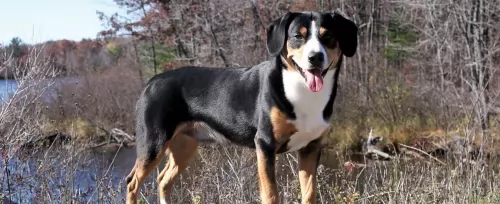 The Entle is a happy, clever dog that needs a job. They are intelligent and physical. They love people and throw themselves at you when they see you. They are loving and loyal but again he has to have a job.
The Entle is a happy, clever dog that needs a job. They are intelligent and physical. They love people and throw themselves at you when they see you. They are loving and loyal but again he has to have a job.
He makes a great watchdog, therapy dog or companion for your children. He only barks when he has to but is wary of strangers and he is territorial.
 Usually Alaskan Malamute is a very healthy breed. They do not have any major issues but like every other breed, they can develop some illness. Cataracta, Chondrodysplasia, and hip dysplasia are the most common health issues, but you shouldn’t be worried because they are not happening all the time. You must talk with people who are giving you the puppy to examine the genetics. With healthy breed, and regular vet checks you will have a happy and a healthy dog for a long time.
Usually Alaskan Malamute is a very healthy breed. They do not have any major issues but like every other breed, they can develop some illness. Cataracta, Chondrodysplasia, and hip dysplasia are the most common health issues, but you shouldn’t be worried because they are not happening all the time. You must talk with people who are giving you the puppy to examine the genetics. With healthy breed, and regular vet checks you will have a happy and a healthy dog for a long time.
 Feeding of your Alaskan Malamute depends on various things. Metabolism, size of the dog, age, quality of the food, build and activity. So you have to understand your dog's needs. Overall, 4-5 cups of high-quality dry food would be enough. Of course, you can give your dog some fruit or vegetables too, as a treat. If your dog likes to spend most of the day on the couch, you don’t have to feed it as much as people who have more active dogs.
Feeding of your Alaskan Malamute depends on various things. Metabolism, size of the dog, age, quality of the food, build and activity. So you have to understand your dog's needs. Overall, 4-5 cups of high-quality dry food would be enough. Of course, you can give your dog some fruit or vegetables too, as a treat. If your dog likes to spend most of the day on the couch, you don’t have to feed it as much as people who have more active dogs.
Developing puppies need more food than an adult dog. They should eat 3-5 times per day, of high-quality puppy food. Puppy food contains more nutrient that will help to develop your dog into a healthy adult.
Grooming Alaskan Malamute may be little challenging. They have a lot of hair, so regular brushing is a must. 2-3 times a week at least. They shed a lot 2 times a year, and you will have to use vacuum-cleaner every day.
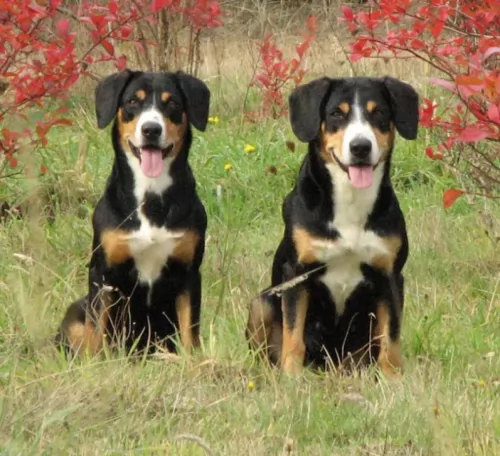 The Entlebucher Mountain Dog is a large working dog. He needs good solid food, but he doesn’t need to be overfed. Give him about 2-3 cups per day fed in 2-3 meals. Be careful of Bloat in the large dog.
The Entlebucher Mountain Dog is a large working dog. He needs good solid food, but he doesn’t need to be overfed. Give him about 2-3 cups per day fed in 2-3 meals. Be careful of Bloat in the large dog.
The Entlebucher Mountain Dog is prone to these issues as well as those mentioned earlier.
Entlebucher Mountain Dogs love to play, to work and to exercise. They are great with people who want to walk them every day, run with them, ride bikes or hike. They can play for hours or work for hours. They need a lot of activity every day and excel at tracking, obedience, herding and agility.